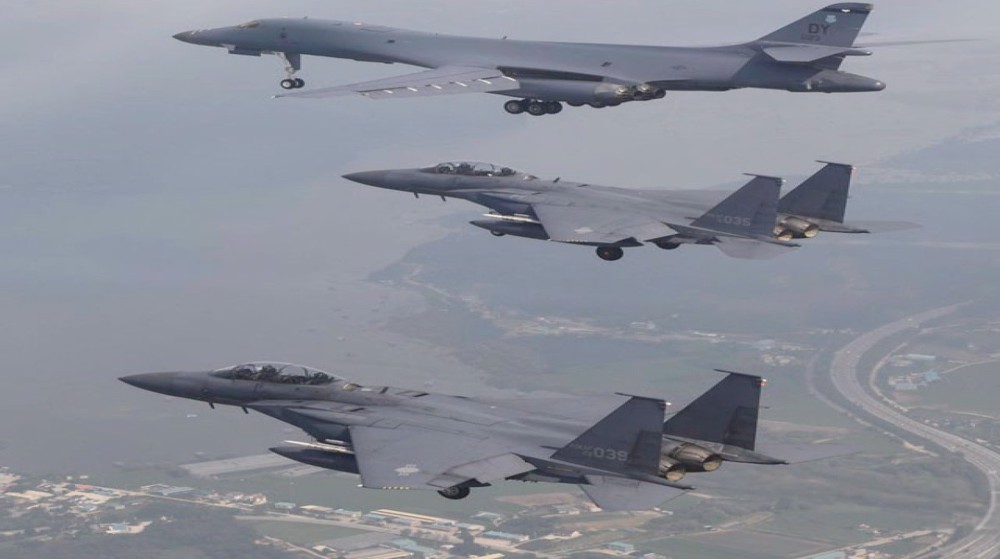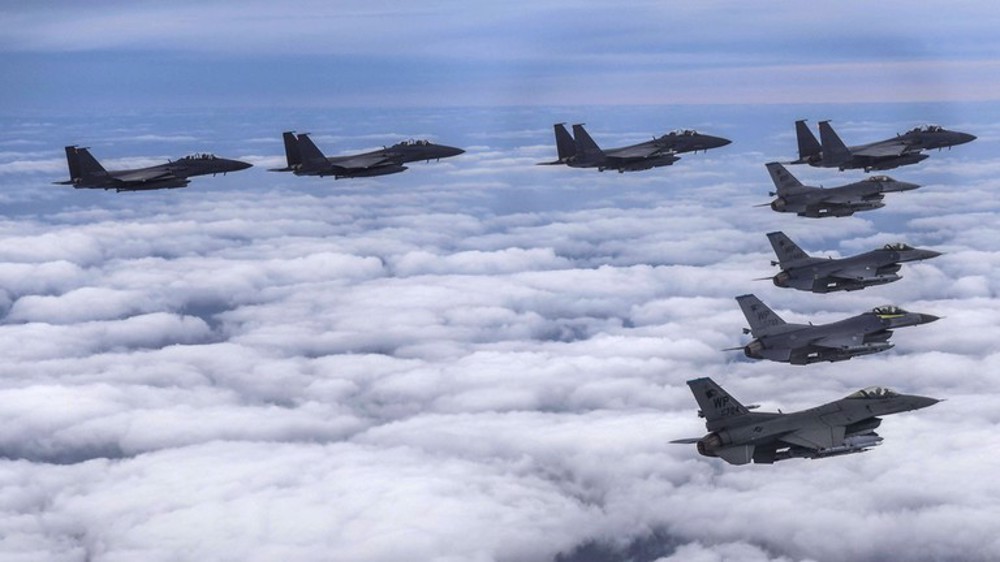Two Koreas exchange missile fires as tensions spike over US-South drills
North and South Korea have exchanged missile fires that landed off each other’s coasts for the first time as tensions escalate over massive joint war games by US and South Korean forces.
South Korea declared on Wednesday that it fired three air-to-ground missiles that landed past the Northern Limit Line (NLL) -- a disputed inter-Korean maritime border -- and off the North Korean coastline, in retaliation to a Pyongyang’s missile launch that landed less than 60 kilometers off the South’s city of Sokcho, which the South Korean president falsely labeled as “territorial encroachment.”
This is while the missile landed outside South Korean territorial waters. Under international law, countries can only establish territorial claim to 12 nautical miles of sea bordering their land.
South Korea’s President Yoon Suk-yeol, who has made it his policy to take a tough line on North Korea, further threatened a "swift and firm response" against Pyongyang so that it "pays the price for provocation."
"North Korea's provocation today was an effective act of territorial encroachment by a missile intruding the NLL for the first time since (the two Koreas') division," Yoon's office said in a statement.
The missile exchanges came just hours after Pyongyang demanded a halt to large-scale joint military exercises by US and South Korean forces, insisting that such "military rashness and provocation can be no longer tolerated."
The United States and South Korea began one of their largest combined military air drills on Monday. Dubbed Vigilant Storm, the exercises involve hundreds of warplanes from both sides staging mock attacks 24 hours a day. The ongoing war games began just days after the allied forces concluded yet another major military exercise – called Hoguk -- that included 22 field exercises, featuring mock amphibious landings and river crossings.
North Korea further emphasized that the recent flurry of missile and artillery fires were in response to the persisting joint war games, which it regards as rehearsals for invading the country.
Moreover, Pak Jong Chon, secretary of the Central Committee of North Korea's ruling Workers' Party, said in a Wednesday statement that the number of warplanes involved in Vigilant Storm proved the exercise was "aggressive and provocative" and specifically targeted North Korea.
He further pointed out that even its name imitated the US-led Operation Desert Storm against Iraq in the 1990s.
"The hostile forces' inordinate moves for military confrontation have created a grave situation on the Korean peninsula," Pak said in a statement carried by Pyongyang’s state news agency KCNA.
According to Seoul’s military authorities, Pyongyang fired 17 missiles into the sea on Wednesday, marking the first time a ballistic missile had landed near the South's waters since the peninsula was divided, and the most missiles fired by the North in a single day.
South Korean warplanes then fired three air-to-ground missiles into the sea across the NLL in response, Seoul's military added, noting that aid the weapons used included an AGM-84H/K SLAM-ER, which is a US-made "stand-off" precision attack weapon that can fly for up to 270 kilometers with a 360-kg warhead.
The North Korean weapon was one of three short-range ballistic missiles fired from the North Korean coastal area of Wonsan into the sea, South Korea's Joint Chiefs of Staff (JCS) said. The JCS later said as many as 14 other missiles of various types had been fired from North Korea's east and west coasts.
According to JCS, the North also fired more than 100 rounds of artillery from its east coast into a military buffer zone established in a military agreement with the South.
"Our military can never tolerate this kind of North Korea's provocative act, and will strictly and firmly respond under close South Korea-US cooperation," JCS said in a news release.
Nuclear-armed North Korea has tested a record number of missiles this year, and officials in Seoul and Washington say the North has completed technical preparations to conduct a nuclear weapon test for the first time since 2017.
Meanwhile, US State Department spokesperson Ned Price claimed on Tuesday that the current joint war games with South Korea were "purely defensive in nature" and that the United States had made clear to North Korea that it harbored no hostile intent towards the country.
Price, however, noted that Washington and its allies had also threatened that there would be "profound costs and profound consequences" if Pyongyang resumed nuclear testing, which would be a "dangerous, destabilizing step."
Also on Wednesday, another State Department official said the United States "condemns the DPRK’s ballistic missile launches and its reckless decision to fire a missile below the defacto maritime boundary with the Republic of Korea."
In a phone call with US Secretary of State Antony Blinken, Seoul’s Foreign Minister Park Jin slammed the North Korean missile launch as "unprecedented" and a "grave act of military provocation." The two top diplomats also condemned the launch and agreed to cooperate against North Korean threats, Park's office said in a statement.
UN rapporteur: Israel engaged in 'ethnic cleansing' in West Bank
French MPs adopt resolution, calling for seizure of Russian assets
Israel jets bomb Damascus outskirts as tanks advance in Quneitra
UN Security Council meeting on Iran ‘blatant political maneuver’: Envoy
US imposes new sanctions day after Trump's letter delivered to Iran
US activists denounce Trump for using 'Palestinian' as slur
Unilateral sanctions hinder Iranian women’s empowerment, prosperity: Experts
Iran summons EU3 envoys over 'provocative' meeting at UN













 This makes it easy to access the Press TV website
This makes it easy to access the Press TV website